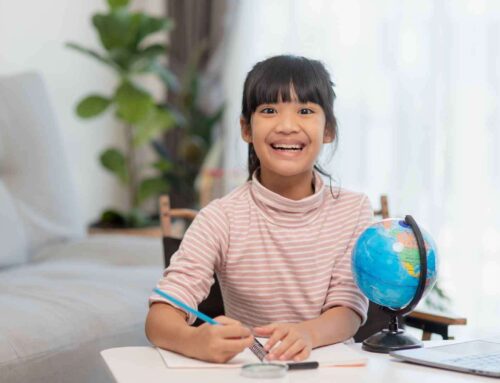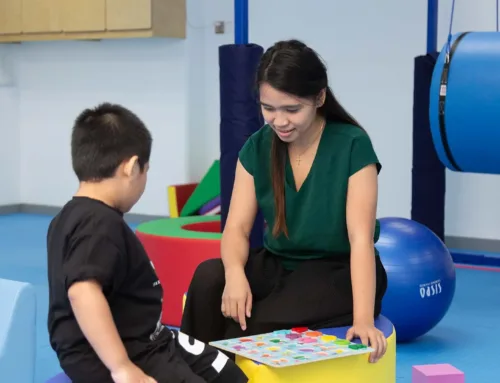Academic struggles can leave children feeling defeated, anxious, or isolated—especially when they are trying their hardest but still falling behind. For children with learning disabilities such as dyslexia, dyscalculia, or written expression difficulties, the traditional school environment often doesn’t provide the individualized attention they need to succeed.
At OrbRom Center in Phnom Penh, we focus not just on academic improvement—but on rebuilding the confidence that often erodes when children are misunderstood or unsupported. With the right strategies, tools, and encouragement, every child can experience the joy of learning again.
What Is a Learning Disability?
A learning disability is a neurological condition that affects how a child receives, processes, or expresses information. It is not linked to intelligence. In fact, many children with learning disabilities are highly intelligent, creative, and capable when taught in ways that work for them.
Common types of learning disabilities include:
-
Dyslexia: difficulty reading or decoding words
-
Dyscalculia: difficulty understanding numbers or math concepts
-
Dysgraphia: difficulty with writing and fine motor tasks
These challenges can affect self-esteem, especially when a child compares themselves to peers and feels “less than.”
Why Confidence Matters More Than Grades
For children with learning disabilities, confidence is often the first casualty. They may begin to say things like “I’m dumb” or “I’ll never be good at school.” When this mindset takes root, it can lead to avoidance behaviors, anxiety, and long-term academic disengagement.
Rebuilding confidence should be at the heart of every educational plan for a child with special needs. That’s where the work at OrbRom Center begins.
Practical Ways to Build Academic Confidence
Here are proven strategies used at OrbRom Center in Phnom Penh—and ones that families can try at home—to support academic confidence in children with learning difficulties.
1. Celebrate Small Wins
Break tasks into manageable chunks, and celebrate each accomplishment. Completing one paragraph, learning five sight words, or understanding a math concept is a big deal—acknowledge it.
2. Use Strength-Based Learning
Instead of focusing only on weaknesses, identify the child’s strengths. Are they creative? Visual learners? Great at remembering stories? Use these strengths as a base to teach difficult subjects.
3. Create a Safe, Pressure-Free Learning Environment
A supportive environment reduces anxiety and encourages risk-taking. Give children extra time, reduce distractions, and remove pressure from grades and comparisons.
4. Incorporate Assistive Technology
Typing instead of handwriting, using audiobooks, or dictation software can help children express themselves without being limited by their challenges. At OrbRom, we also use educational apps and tools that are designed for learners with specific processing needs.
5. Use Multisensory Teaching Techniques
Children with learning disabilities benefit from instruction that involves touch, movement, visuals, and sound. Whether it’s reading with finger tracing or building numbers with objects, this approach strengthens comprehension and engagement.
How OrbRom Center Supports Children with Learning Disabilities
At OrbRom Center, we offer a specialized Special Needs Intensive Intervention program that focuses on remediating academic skills while also nurturing self-esteem and emotional resilience. We assess each child’s strengths and needs and tailor intervention sessions to support both cognitive and emotional development.
We also provide diagnostic Assessments for learning disabilities and developmental delays—giving families in Phnom Penh clarity on their child’s unique learning profile and actionable next steps.
Our individualized approach includes:
-
One-on-one academic support
-
Emotional coaching and motivation building
-
Sensory supports where needed
-
Progress tracking and frequent feedback to parents
Tools That Support Learning Confidence
Some children need additional sensory or organizational tools to feel comfortable while learning. Consider using:
-
Weighted Sensory Blanket – for calming anxiety before study sessions
-
Noise Cancelling Headphones – to help reduce distractions
-
Visual schedules and timers – to build structure and time awareness
These tools, available in our Phnom Penh-based sensory shop, complement therapy and support independent learning habits.
Final Thoughts
Every child deserves to feel capable and confident in their learning journey. With the right support, children with learning disabilities can overcome obstacles and discover their strengths. The path to academic success doesn’t start with tests—it starts with belief. Belief in a child’s potential. Belief in their ability to grow. And belief that with the right help, they can thrive.
If you’re in Phnom Penh and concerned about your child’s learning progress, OrbRom Center is here to support your family with expert assessments, therapy, and targeted interventions that build both skills and confidence.
We are the only Preschool specialized on children with special needs in PhnomPenh.
- Internationally qualified teachers
- Cambodia’s largest sensory room
- Outdoor swimming pool
- Covered outdoor playground📞 Phone: 077.455.993
Telegram Link: https://t.me/OrbRom







